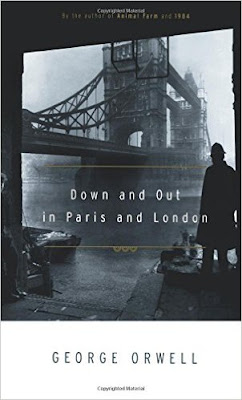Thursday, December 1, 2016
Down And Out in Paris and London
I've been looking forward to reading this book for a long time. This and "Homage to Catalonia" are two of Orwell's books I'd never gotten around to, so it was good to get my hands on this volume. After 1984, Animal Farm, and many of his essays, my expectations for this wok were very high and Down and Out didn't disappoint. It falls a little short compared to his great classics, particularly 1984. I love Orwell's prose style for it's clarity and concision, and in this book he develops some of the themes that later became the foundation of his genius - his great concern for human welfare, and a fascination with society in it's relation to the individual. This was one of the attractions of this book - seeing a genius at work on the development of his overriding themes.
"Down and Out" is an observation of life in the Parisian and London barrios of the early twentieth century that also conveys many of the larger cultural difference between Paris and London, and I found that fascinating. In the opening of the book Orwell sketches the Parisian barrios so well that (for better or worse) you feel you've been there with all the filth, the hardship, and the desperation. It seems that in Paris life under these conditions more than endures, in its peculiar way almost flourishes. So many great artists have emerged from the Parisian barrios, one sees them as almost an asset to society. Yet Orwell does not in any glorify such an existence. He's upfront about it's suffering and its great risk to one's survival.
The overall theme of the book, which is a work of fiction that reads like autobiography, contrasts such lives in Paris and London, respectively, and the conclusion is that if one were poor in Europe at the time, it would have been better for one's chances of survival to to be in London, but far better for one's spirit to be in Paris. In London one would have probably had less chance of dying outright from deprivation, but without an extraordinary stamina and imagination (as exhibited by one particularly clever character in the novel, a street artist) life would have been unendurable drudgery.
Orwell makes the point that lives of such hardship and hopelessness are unnecessary, and he addresses a little of that question directly, but as in his later work, fictitious revelation is used more than direct explanation. The virtue of the book is its detailed observation of life at the margins, its empathy for its subjects, and its manner of allowing you to live that life vicariously a life that, like it or not is the enduring condition of great multitudes of mankind. It gives a window onto a tragic and pervasive aspect of existence allowing you to experience it without having to pay the price inherent in living it.
Brent Hightower
Copyright 2016 Brent Hightower
21stcenturyperceptions.blogspot.com
Subscribe to:
Comments (Atom)
